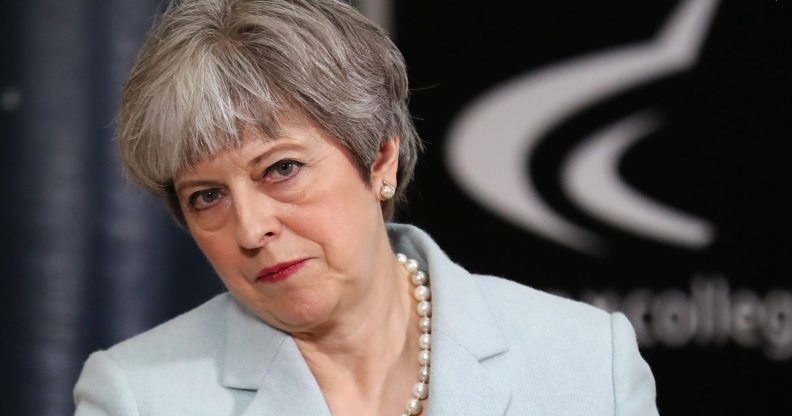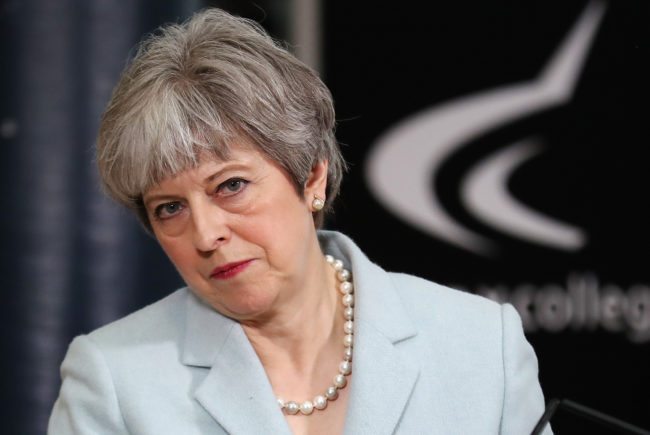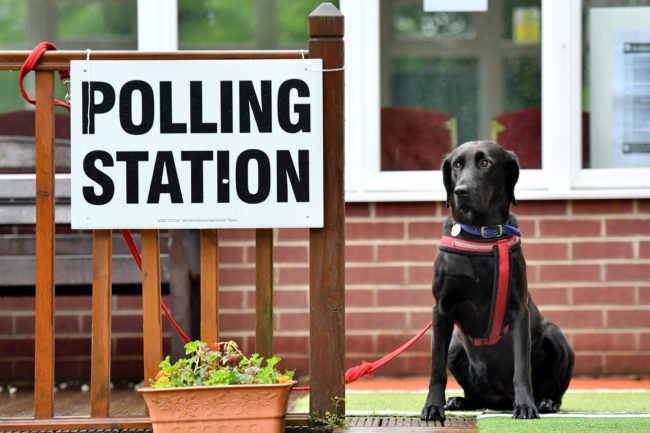Fears that UK ‘voter ID’ rules could stop transgender people from voting

(Getty)
Equal rights groups have warned that new rules that force voters to show photo IDs could prevent transgender and gender non-conforming people from voting.
The UK government is rolling out voter ID pilots across four local areas, Watford, Bromley, Gosport, and Woking, at the local government elections in May this year.
Under the plans, voters in the pilot areas will be required to show ID, such as a passport or driver’s license, before they can vote – ahead of a planned wider rollout in future UK-wide elections.
The Conservative government’s plans have been strongly criticised by the LGBT Foundation and Stonewall, who today joined with democracy campaigners to warn about its potential impact on “transgender and gender non-conforming people”.

British Prime Minister Theresa May (Photo by Christopher Furlong – WPA Pool/Getty Images)
Campaigners have compared the pilots to the exploitation of voter ID laws in the US – where the enforcement of restrictive state-level voting laws is proven to have had a disproportionate impact on minorities.
US-based LGBT rights groups say the state-level laws have had a substantial impact on transgender voters, who often do not have up-to-date IDs that ‘match’ their name, gender identity or appearance, due to the disproportionate cost.
PinkNews asked the Cabinet Office and the four councils involved in the UK voter ID pilot to clarify how they will ensure that transgender voters are not impacted.
PinkNews also asked what procedures have been put in place for transgender people whose current appearance does not match their official forms of ID, and asked what guidance will be provided to polling station volunteers on how to process issues relating to transgender voters.

(Photo by Anthony Devlin/Getty Images)
A Cabinet Office spokesperson told PinkNews: “Local authorities are implementing Equality Impact Assessments and are working with partners to ensure that voter ID does not risk preventing any eligible voter from voting.
“It is in nobody’s interest that any elector is disenfranchised. Everyone eligible to vote will be able to do so.”
Each local authority was apparently required to complete an Equality Impact Assessment to ensure they take into account the needs of the trans community.
However, none of the councils could provide details of any policies or guidance relating to transgender voters to PinkNews, nor any specific policy for resolving cases where voters are deemed by polling station volunteers to not match the appearance or details on their photo ID.
Stonewall exec Ruth Hunt told PinkNews: “We are concerned by the potential unintended consequences of the Government’s voter identification pilots and their use of photo ID.
“Access to photo ID can prove very difficult for some communities, including those who are BAME, disabled, or homeless, and LGBT people will of course make up part of these groups.
“For trans and non-binary people in particular this has the potential to cause significant problems, as some may not have photo identification that accurately reflects their gender identity. It’s not hard to imagine the challenges and confusion that could result from that in a polling station.
“We’re urging the Government to reconsider the proposed pilots and instead take steps to engage communities in future schemes, to ensure that more people from more communities feel empowered to vote.
“For elections, and elected officials, to be truly representative of the communities they are supposed to serve, we need to put effort into encouraging more minority groups to use their votes; not put in place measures that make it more difficult.”
Bromley, Gosport, and Woking councils all specify that voters will need to bring forms of ID, which could dissuade vulnerable trans people from showing up.
The pilots in Bromley and Gosport require voters to bring photo ID such as a passport or driving license to vote, or alternatively a polling card plus a form of non-photo ID such as a birth certificate or utility bill.
Woking only permits forms of photo ID, and requires people without forms of accurate photo ID to apply for a local elector card ahead of the vote.
In Watford, voters only need to bring their polling card in order to vote.
The LGBT Foundation and Stonewall signed on to an open letter headed by the Electoral Reform Society criticising the plans, alongside more than 30 other charities and NGOs.
The letter warns about potential impact on minority groups including transgender voters.
It says: “We are writing to express our collective concerns for the Government plans to pilot identification in polling stations at the local government elections in May.
“The Government’s commitment to building a safe and secure democracy is commendable. Electoral fraud is a serious crime and has the potential to undermine public confidence in elections, even if conducted on a small scale.
“However, there is simply not enough evidence of voter fraud in the UK to justify these potentially damaging pilots, which threaten to disenfranchise members of some of the most vulnerable groups of society. In 2016 there were 44 allegations of impersonation – the type of fraud that voter ID is designed to tackle – out of nearly 64 million votes, reflecting just 1 case for every 1.5 million votes cast.
“By comparison, the Electoral Commission has warned that 3.5 million people (7.5% of the electorate) in Great Britain do not have access to any form of photo ID. 11 million electors (24% of the electorate) do not have access to a passport or photographic driving licence.
“As organisations who support and represent a diverse range of communities, we have serious concerns that these proposals present a significant barrier to democratic engagement and risk compromising a basic human right for some of the most marginalised groups in society. Decades of international studies show that restrictive identification requirements are particularly disadvantageous to certain voter groups who are less likely to possess approved ID for a variety of socio-economic and accessibility reasons.
“Voter ID reforms could therefore affect young people, older people, disabled people, transgender and gender non-conforming people, BAME communities and the homeless.
“We are aware that the Local Authorities participating in the pilots will be providing alternative options for people without the photographic identification to vote in the local elections in May. However, we believe the measures do not go far enough to alleviate the potential risk of disenfranchisement and deterrent to voting.
“We are also concerned that the Local Authorities involved have failed to carry out adequate equality impact assessments of the pilots on protected individuals in their areas. We would be grateful to learn what assurances you can give us in this regard.
“We are also very concerned about the low levels of public awareness of the pilots and proposed reforms. We fear that many people will be unaware of changes to the voting process.
“To ensure that voters are not disenfranchised, it is vital that there is wide coverage of the new voting arrangements and that communications are accessible to everyone. Unfortunately there is little evidence to suggest that this has taken place in the various pilot areas even though the elections are now only two months away.
“In December, the Cabinet Office published a five-year democratic engagement plan designed to increase participation in democracy. It is disappointing that these electoral pilots directly undermine this worthy objective.
“We hope you listen to these concerns and urgently reconsider your decision to run the pilots as planned in the May local elections. We would be very happy to meet with you to discuss these issues in more detail and how our concerns may be mitigated.”

